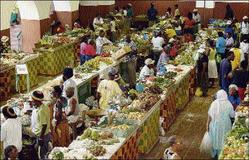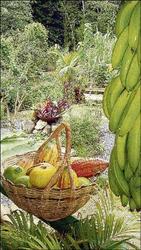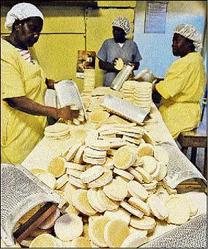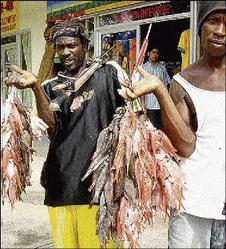Rosemary Parkinson, Gleaner Writer

Caribbean markets show the bounty of the islands. - photos by Rosemary Parkinson
There's nothing left except a fiery accent and that determined stubbornness that come with being Irish. Loretto Duffy-Mayers 'adopted' Barbados in 1985 and is an ardent environmentalist. Through the years, she has held the position of environmental manager in three Barbadian Green Globe hotels and her voice has been heard loud and clear during national and regional meetings of the environmental committees on which she serves. The Caribbean could have a monumental environmental problem before it. But, perhaps it can be saved if we listen to people like Loretto.
Many moons ago, these abundant islands were plundered as colonial dumping and extracting grounds for all that changes rich lands and societies into a solid mess, dependent on the 'big guys'. Governmental independence did not remove this dependence but inherited the bad practices required for the 'almighty dollar'. Tourism is one of these legacies that has done/is doing its share of damage. It need not be so.
MAKING THE CHANGE


Duffy-Mayers
The people are the 'experts' able to repair this sad state of affairs. But, many do not care. Our political leaders, now beginning to extol the importance of 'environmentally friendly', prove only that the wheels of government move far too slowly. The deeply-imbedded, 'dirty' culture from 'outside' is creeping into our societies. As I travel up and down the islands, I feel a dull knife stabbing my back, the fear that we are losing the battle. Not so, says Loretto, whose Irish history taught her that the battle must produce blood before it is won.
She notes, "Hotels in the Caribbean have to adopt environmental standards in order to ensure the longevity of the tourism product. An environment management system (EMS) is a tool for managing the impact of an organisation's activities on the environment. It provides a structured approach to planning and implementing environment protection measures. An EMS integrates environmental management into a company's daily operations, long- term planning and other quality management systems. Simple, once it is learned." Loretto heads the environmental protection of Almond Casuarina Beach Hotel during its new transition - the previous Casuarina Hotel being one of the three she led into Green Globe certification. Within all the agenda items required to successfully maintain an EMS is food. Contractual arrangements between Almond Casuarina and organic farmers are being put in place. When reopened next year, the property should be a good model of an EMS hotel.
NOW FOR THE FOOD
Since the late '90s there has been an increase in the publication of Caribbean recipe books that have kept our foods in some limelight. In May 2006, Bon Appétit devoted an entire issued to Caribbean cuisine. With Food Network celebrity chefs suddenly cooking "our foods" - the term 'soon come' started to seem closer to "we deh" (i.e. we get it now!) with many islands finally realising that Caribbean cuisine is worth its weight in gold.
Some hotels/restaurants are making direct contracts with farmers - Mocking Bird Hotel, Sandals in Jamaica and St. Lucia, Four Seasons in Nevis, Hilton Tobago, Jungle Bay Dominica - the latter country trying for Green Globe certification of the whole island.
The word is spreading with people like Loretto fighting the fight. Another strong voice is that of consultant chef, Robert Oliver (New Zealand/Fiji/Trinidad and Tobago), who has done a tremendous job joining the Almond group in St. Lucia and Barbados with farmers. Little dents like these in our large food importation bill from the north are better than none. Truth be known, this journey for the Caribbean only requires the motto: "Let's get back to our roots, as soon as possible" followed by "Hurry up with Caricom Single Market and Economy."
THE BOUNTY THAT IS OURS

An organic farm in Dominica, with a river flowing right through it.
Most of the Caribbean island chain, whether volcanic or coral, is blessed with rich soil. Cane that requires little or no maintenance grows almost wild and readily gives us the best sugar and rums in the world. Mountains, valleys, sides of the road, even backyards, show off trees that droop with the bounty of the 'exotic'. Breadfruit, guava, mango (hundreds of species), lime, jackfruit, ackee, oranges, grapefruits, star apples, guineps, pineapples, breadnuts, cherries. Spices such as nutmeg, cinnamon, pimento, just to name a few. Bushes flourish with Scotch Bonnet peppers; vines with sweet potato, cassava and yam. Grasslands feel the presence of cattle, pigs, chickens roaming freely. Rivers, reefs and seas teem with fish and crustaceans. The road to environmentally friendly and organic is already paved but, in dire need of pothole repair.
With the old traditions of understanding that harmony with nature is our survival, we must ensure that our lands and waters are kept free of destructive, non-degradable rubbish and pesticides. We must learn to harness all that grows 'wild' (without getting rid of 'wild') within organic farms that produce the good stuff in a constructive way, that is; meeting demand rather than just planting.
We have to stop exporting the best to the north for we only receive inferior in return. Owners of hotels and restaurants have to see the mor-ality in understanding and honouring the ecosystem and those who toil the land. Once these things are strictly adhered to, there is no doubt that environmentally-friendly tourism can provide a long future, rich in health and wealth, for us island people.
Rosemary Parkinson continues the fight.

Making bammy from the indigenous cassava at Tijule in Jamaica

Bringing in the bounty off the reefs.

